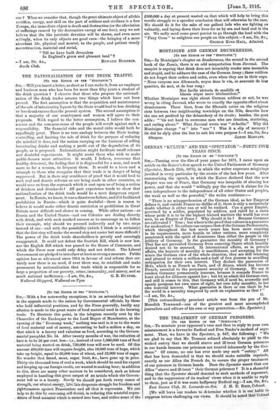GERMAN " KULi Let " AND THE "SPECTATOR"—FORTY-FIVE YEARS SINCE.
[TO THE EDITOR OP HE " SPECTATOR.")
Sit,—Turning over the files of your paper for 1871, I came upon an article on the Kaiser's first speech to the United Parliament of Germany (Spectator, March 25th, 1871), in which the writer expresses misgivings justified in every particular by the events of the last few years. After summarizing the speech, in which the Kaiser declared that the new Empire was one of Peace, that Germany was incapable of abusing her
power, and that she would " willingly pay the respect it claims for its own independence to the independence of all other States and peoples, the weak as well as the powerful," the writer continues
There is no misapprehension of the German ideal, as her Emperor defines it, and outside France no dislike of it, there is only a melancholy doubt whether it either can or will be realized. Can a great Empire, governed by a soldier, populated by soldiers, and ruled by a caste whose pride it is to be the highest trained warriors the world has ever seen, be an Empire of Peace ? Why should it be ? Because Germans are cultivated ? True ; but where is the proof that culture is a guarantee for moderation ? No culture can surpass that of the German Professorate, which throughout the last seven years has been more exacting in its requirements, more hostile to other nations, more completely penetrated with the spirit of dominance than either the people or the , soldiery of Germany. Is the guarantee the morality of Germany ? That has not prevented Germany from annexing States which heartily desired not to be annexed. In international affairs, as in private affairs, the keynote of morality is unselfishness, and accepting for the nonce the German view of the whole situation, they are still retaining and pleased to retain a million-and-a-half of free persons in unwilling subjugation for their own interest. They declare the possession of Metz, which is as French as Paris, and of Alsace, which has become French, essential to the permanent security of Germany. We say it renders Germany permanently insecure, because it compels France to hunt about for alliances against her ; but let us admit the German case, and still it comes to this, that Germany will, if need be, avowedly and openly postpone her own seise of right, her own lofty morality, to her own material interest. What guarantee is there or can there be for the world in a morality tempered by such an explanation as that ? "
[This extraordinarily prescient article was from the pen of Mr. Meredith Townsend—one of the greatest and most accomplished
journalists and editors of his own or any generation.—En. Spectator.]


































 Previous page
Previous page